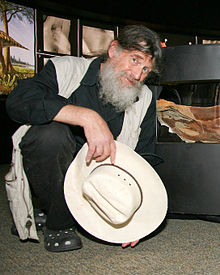Dr. Robert T. Bakker is one of palaeontology greatest and most well known characters. Bakker was the first man who hypothesized that dinosaurs may have been warm-blooded, and was the scientist who believed that diseases caused the demise of the terrible lizards. He is also the author of the famous book The Dinosaur Heresies.
Bakker took his childhood love of dinosaurs to Yale University, where he studied under the great John Ostrom. Bakker later received his Ph.D. from Harvard University. He has taught at the University of Colorado and has held numerous jobs at several museums in Colorado and Wyoming, including the Tate Museum, where he is now the Adjunct Curator. Since the summer of 1974 he has returned to the famous Como Bluff dinosaur sites summer after summer in order to attempt to put dinosaurs in context.
Bakker’s Colorado field work has produced numerous results. Among his findings, he has located dinosaurs that lived in totally aquatic environments, and others that could have only lived in trees. He can also tell you that Stegosaurus was only common on well drained, dry soil. Apatosaurus and Camarasaurus were found everywhere, Bakker stated. Bakker has also done a great deal of field work in other states, including Montana, Utah, Oklahoma, other countries, including Mongolia, Zimbabwe, and Canada, and in numerous other quarries. He has also discovered the only complete Apatosaurus skull and the very first and earliest raptor found in the Camarasaurus quarry.
While Bakker’s field record is very impressive, he is internationally known for his controversial theories that continue to light up palaeontology, and science in general. The hypothesis that is always mentioned in the same breath as Bakker is his theory of warm blooded dinosaurs.
The hypothesis that Bakker has drawn the most heat for has been his notion that the dinosaurs were killed off not by an asteroid or volcano, but by disease. According to Bakker, a comet or asteroid would have killed everything. Instead, the answer lies in migration. When big animals are spreading and mixing, he says, extinctions occur. He points to the findings that Indian and African elephants make each other sick to strengthen his belief. “When a new animal or plant is introduced to a new habitat bad things happen,” he stated.
The palaeontology career of Dr. Robert T. Bakker has been full of exciting finds and controversial theories. While he may draw fire for some of his ideas, it is safe to say that Bakker’s theories have led to the new image of dinosaurs-smart, active, caring, and highly interesting beasts! Bob Bakker is also an ecumenical preacher. Such a combination makes him an excellent speaker that’s bound to draw big crowds to any public event.



 March 9th, 2013
March 9th, 2013  Riffin
Riffin 
 Posted in
Posted in  Tags:
Tags: 
We аre a group of volunteers and opening a new scheme in our community.
Your ԝebsite offered us witһ valuabⅼe information to woгk on. You’ve ԁone a formidаble job and our entire community wilⅼ be tһankfuⅼ to
yoս.